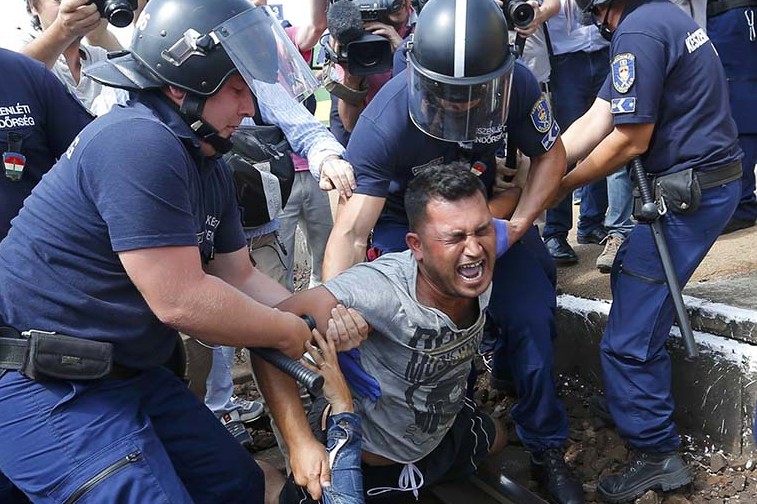This Sunday is Social Justice Sunday, a day where we are invited to revisit our commitment to social justice.
Each year, to assist us in marking this day, the Australian Catholic Bishops Conference publishes its Social Justice Statement. It is always released in advance of Social Justice Sunday, meaning that the theme is chosen well ahead of its September release.

The themes for the statement in the past 10 years have included sport, poverty, families, prisons, peace, young people and Indigenous Australians.
Prophetically, this year’s statement highlights the need for justice for refugees and asylum seekers. Titled: “For those who’ve come across the seas.”
The Social Justice Statement is always an important read for Catholics, but it is even more critical at the moment given that we are having a national conversation about asylum seekers, and we are preparing to welcome an additional 12,000 Syrian refugees into our country.
The statement uses key aspects of Catholic social teaching to demonstrate to us that concern for refugees and asylum seekers is a truly Catholic concern, and of primary focus is the principle of human dignity.
The bishops remind us that the principle of human dignity means that “each of us possesses an inestimable value … and deserve respect because we are human and loved by God”, and requires that we never use human beings as a means to an end.
In the background of the present situation in Australia and abroad, the focus on human dignity is timely.
It is timely because we might be tempted to think of the current “refugee crisis” as consisting of the stories of unique, unrepeatable individuals.
We hear numbers like 19.5 million refugees and 59.5 million internally displaced persons and it is difficult to think of them as individual persons with fears, hopes and dreams.
Instead, it is easier to think of them as unlike us, either because we consider them to be a group of faceless persons or – when we do see their faces – we consider that they look different enough that we do not consider them to be like us.
Or, if we do decide that they are “like us”, we are tempted to impute our own standards on to them, judging their actions in light of how we like to think we would or should behave in the same circumstances.
It is also timely because it seems that we are daily confronted with more stories and images of what it looks like to forget the humanity of these refugees.
Hungary has built razor wire fences along the entirety of its borders with Serbia and Croatia.
It passed emergency laws which will see asylum seekers who cross the border liable to criminal charges as well. And they were just in the news for firing water cannons, pepper spray and tear gas at those trying to enter.
Croatia has closed almost all of its entry points with Serbia.
The Netherlands announced that food and shelter will be cut off from those whose claim for asylum has failed.
And trains bound for Austria and Germany have been stopped, with those trying to leave kept back with batons.
Razor wire. Water cannons. Pepper spray. Tear gas. Deprivation of food. Batons.
Human beings are being treated like animals.
This isn’t only happening overseas. The bishops remind us of the tendency to undermine the human dignity of asylum seekers by treating them as a means to an end occurs also within our own country (or at least, just outside its borders!).
The bishops pull no punches. They tell us:
We pretend that the pain and diminishment of one group of people, including children, is a justifiable price to pay for sending a message to others. This policy dishonours the human dignity of people who seek protection and denies the truth of their humanity … The actions of recent Australian governments from both sides of politics to ‘send a message’ to people smugglers by turning back boats, detaining people offshore and refusing resettlement have effectively made vulnerable people a means to an end.
With almost every nation finding reasons to treat the refugee and asylum seeker as “other”, there is no more appropriate theme for focus this Social Justice Sunday than the plight of those fleeing their homeland. But what do we do about it? How do we ensure that we do not also excuse ourselves from upholding the human dignity of those seeking refuge?
I think we begin by extending the hand of friendship to those within our communities who have come across the seas. I know of no Sydney parish which does not have a migrant or refugee family within it.
We also lend our support to those Catholic agencies like the St Vincent de Paul Society who currently welcome our refugee communities, and which will do the same for the increased numbers Australia will accept in the coming months. And we can ensure that whatever our opinions are about how best to respond to this present challenge, we express them in a way which always upholds and affirms the human dignity of those involved.
“The call to be a Catholic, a radical and counter cultural call, at its deepest core, urges us not to stand on the sides but to become involved in bringing about a more just society. So I would call upon parishes, and most importantly, individuals to look at the little opportunities in our own lives where Christ is calling us to express charity and solidarity to migrants and refugees.”
– Bishop Vincent Long OFM Conv, Bishop Chair for the Pastoral Care of Migrants and Refugees.
